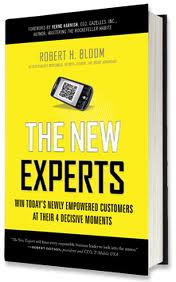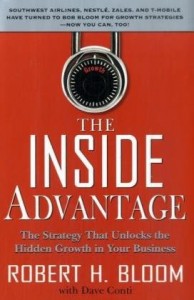Robert Bloom – How the web has changed advertising
Robert Bloom is the author of ‘The Inside Advantage’ and ‘The New Experts‘ as well as the former CEO and chairman of Publicis Worldwide, and a widely respected authority on business growth. He has helped craft and implement the growth strategies of some of the world’s largest companies and directed the launch of numerous brands that have become household names.
Robert took the time to talk to me via Skype from New York.
[youtube=http://www.youtube.com/watch?v=czUMcpEyYOY&rel=0&w=560&h=315]
Transcript
Adam Franklin: Hi, it’s Adam Franklin, and I’m incredibly grateful to be here with Robert Bloom live on Skype from New York City. Thanks for joining us today, Bob.
Robert Bloom: It’s a great pleasure Adam, thank you.
The web has changed advertising
Adam Franklin: Now you’ve had a remarkable career in the advertising and marketing world as CEO of Publicist Worldwide, and you’ve also written two books that I found incredibly valuable: ‘The Inside Advantage’, and of course your new book, ‘The New Experts‘. Now one of the major changes you’ve witnessed and we’ve all witnessed over the last 10-15 years is the explosion of the internet. Just what impact has the web had on the way companies and individuals should approach advertising and marketing?
Robert Bloom: I think the tremendous impact which business leaders of all kinds everywhere don’t realise fully… I know that they know it occurred, but they don’t really understand it how devastating it’s been to them.. The real impact, Adam, has been on customer, it’s almost like the technology was a rocket that was guided and -instead of hitting the businesses – they went after the businesses’ soft underbelly, and what was that? and that’s the customers, and nobody can do without customers, and they went after them first because they were most vulnerable and you know, the two reasons that this has happened – it’s been two things that have changed the world in every way but particularly the business world: One is globalisation; we all had our niche local markets, and it was a nice territory and we were familiar with it, and then globalisation came. Two – Things came with a huge amount of competition in every category, so that every category is overcrowded today with not just domestic business in Australia or the US or Europe, it is crowded with a lot of international competitors, and that’s been facilitated by technology.
So, basically, it’s kind of technology and globalisation forming a partnership, obviously imaginary, but I think actually this is what’s happened – not how it happened – but this is what’s happened. So those two driving forces have created a customer today that is a very different customer than business leadership are used to dealing with and – my point in that in response to you is that – I don’t think that the business entity is yet ready to deal with this in the full measure that they have to.
Customer loyalty is dead
Adam Franklin: Because in ‘The New Experts‘ you make a very provocative and confronting statement and that is the fact that customer loyalty is dead, you say people no longer care who they buy from. Now I’d like to know why is this, and what must we do in light of this confronting fact?
Robert Bloom: Well you have to start back at ground zero you know, when Adam and Eve were running around, and you know, there were sellers there but the sellers for thousands of years have had control of the buyers – that’s very simple. Why? Because the seller had all of the knowledge, and knowledge is power, so the poor buyer you, and me, and all of us were compliant and we said, ‘Oh my goodness, thank you for selling me something, and do you have it in green?‘
‘No, I don’t have it in green I have it in blue.’ Of course he had it in green, but he didn’t have it in inventory so he won’t sell it you. So the seller has been in control, but what’s happened is that the equation has changed and the buyer has taken control.
Why has the buyer taken control? Because the buyer has knowledge now which he or she never had, and they like what it has given them – what has given them is power. And power over what? Power over whom, power over the person who is trying to sell them something. Because generally, the people who are selling today don’t know as much as the buyers. The buyers have all gone to work on the internet. They know what they want to buy, they know what they want to pay, they know what competition is, they are ready to go. They’ve done all their checks and verification on multiple sites and on their handhelds and their apps, and they know precisely what they want to buy.
So that they are in control and the business community has not yet recognised that amount of power. And mobile commerce is really going to go through another major transformation, we’re going to go from PCs… which are not going to exist in another year or two they just won’t exist, and, whether I’m right on the timeline or not, it’s going to be very soon maybe sooner than you think. Like Dell, it’s now trying to buy the company back, so they are in control …and I don’t think that customers are yet prepared enough, and it’s been a phenomenal change that business leaders have to recognise and confront.
Inbound vs Interruption marketing
Adam Franklin: And so the fact now that buyers have all the information and all of the control, I guess that has contributed to this notion of inbound marketing where a lot of the buyers can research information, find out about the product, the company, who they’re going to be dealing with well before they pick up a telephone or even before they turn up to the store. People are actually buying products now on site, based on reviews on the internet. And that whole notion of inbound marketing is quite a new one that’s come about with the introduction of the internet.
Robert Bloom: Absolutely.
Adam Franklin: Now, what’s your take I guess… What’s your take on inbound marketing versus traditional marketing, which some people call interruption marketing?
Robert Bloom: I think that all of those segments are valuable. I think it depends on what business you’re in, what sector you’re in; I think it depends on what stage of development you’re in, and what you want to get out of it. I mean, let me give you an example: at Christmas Amazon offered, in New York City, offered a free same-day delivery. Free same day delivery! So here’s Macy’s sitting there, you know, charging somebody for delivery, and they’re buying online in the other places as well they’re getting free delivery. Whether they have to go Macy’s or Bloomingdales or the jewellery store, whatever it is, they’re not ready yet to deal with this. So I think inbound marketing has a real place, I think that the phenomenal change is really on mobile commerce, I think the M commerce will change everything. And all of these other segments you’re talking about – like inbound, like interruption marketing, like all of these things – are valuable. They all have to figure out where they really work. If you try to put them all together at one time – for whatever kind of issue, problem or challenge a company might have – it’s a mistake because you won’t really get your money’s worth. So you have to select what you think is your best weapon, or our best weapons, which in this case could be a combination of things.
Marketing a business in today’s web world
Adam Franklin: Perfect. And the question I’ve been really wanting to ask you Bob: If you were suddenly appointed Marketing Manager or CEO of a mid- to large-sized company, what would you decide to do in terms of marketing the organisation?
Robert Bloom: I would start with my strategic mining. I’m writing a third book the title of which is ‘Your Strategy is Obsolete’, and I believe it’s obsolete because, you know, the planning protocol today is the same planning protocol that has been around for a very long time. And so, the world has changed and that planning protocol is no longer appropriate. So what I would do is I’d use a new planning protocol and, by the way, in my book I’ve offered a new planning protocol.
And I think the biggest problem is most planning starts where, Adam? It starts…as you and I have experienced, and most of the viewers will …it starts with, “Let’s get the financial plan done.” Right? So, day one you do the financial plan and you know, you have several choices. What do you do? You look at the last five years, right? Of financials. And you say, “Well I’ve to beat those.” Right? So immediately, what are you doing? I’m looking at your face right now, but I mean what you’re doing is you’re turned around you’re looking backwards not forwards, right there. So people will say, okay well what you’ve got to do is okay, I buy that: Don’t look backwards, but maybe I should look over the at the horizon. But you won’t see anything at all, because the horizon’s been there for longer than anybody on this planet and it hasn’t changed; so all of your competitors are looking ahead, trying to identify something. But the businesses that are really beating the drums and doing this are led by people – to answer your question – who want to look around the corner, who want to find something that not taken, that’s a real breakthrough.
And so you’ve got Jeff Bezos at Amazon, who really does this. And it’s amazing, what he’s built: the biggest online company in the world you know, out of nothing. And you look at Steve Jobs, the late Steve Jobs, I mean my God, you know, these people! This wasn’t looking backwards, this wasn’t looking ahead. You don’t come up with the world needs a tablet. And what most of the people are doing are chasing that and saying, “Well I’ve got to put out a tablet,” everybody says, “Well I’ve got to get this tablet out there.” Putting out another tablet is not a solution to it, so what I would do is – to start with, not with numbers, because after you lock in the numbers on day one you don’t have any money to spend. Can you imagine somebody going into Bezos, and he said after they’ve done the financial plan this is not… I’ll bet you this is not how they do it, but they do the financial plan first day and they got us locked in. At the end of the day everybody does a high five and says, “Hey we’ve got the financial plan done.” So the next day they say, “Let’s improvise, let’s imagine, let’s really think out of the box, let’s do some great things.” And you come up with a list of things that we can do and everybody says, “God, this is really fun and great!” and then the CFO looks up and says, “We don’t have any money left. We locked it in yesterday.” So somebody goes to Bezos and says, “Jeff, you don’t have enough money to do that new electronic reader that you want to put out.” He says, “To hell with you, I’m going to get that done. I’ll borrow the money from someplace we’ll find a way to do it, and then we’ll be able to do it.” And that’s what those kinds of people do, that’s what needs to be done, you have to start with innovation first, then do the financials turn the whole thing around so that that’s really what you’re doing. Does that make sense to you?
Adam Franklin: That does great answer, thank you Bob, a very passionate answer there and very much looking forward to the next book. When do you anticipate that will be released?
Robert Bloom: I hate to always anticipate that because I’m not a fast writer and it’s still a challenge to me. You know, I was very good at writing strategic documents, you know, and they were dull as hell. And so I first started writing books. Everybody told the publishers, the agents, and so forth, “This is really a great idea,” but it’s dull as hell to put some life in it. So I still have challenges doing that and that’s what I’m in the process of doing. But, this is a fun… I think this in itself, is a fun thing to do is to say, Let’s take this to the world. If you don’t – to answer your question as clearly as I can – what I would do is: not start it the way everybody else is starting, I would change the venue, I would change the way it’s being done, and I’d start by coming up with five big ideas or 20 big ideas, narrow them down to the ones I want, and say, “This is what we’ve got to do.” Now, there are people like Bezos, or people like Jobs, that do this intuitively you know, and most of us can’t. We need some kind of a process. And that’s what I’ve done, is developed a process that can lead you through the steps you’ve got to take, in order to get to this kind of approach.

Robert Bloom: Amazon is still the best place in the world you could get it: they’re both there as e-readers, they’re hardcopy books, they’re used books. I would tell them not to buy a brand new book. It’s overpriced and you know, nobody makes any money on publishing today. So that would be the best place, but they’ve tried through their local bookstores – some of them do, some of them get it. When I was in Australia many of the people wanted the books, and they had both books available.
Adam Franklin: Fantastic, and any of our Brisbane viewers can pop around to the Bluewire office, and we’ve got both of Bob’s books on our bookshelf, so feel free to phone and drop by.
Robert Bloom: Also, thank you very much. What they can do is, immediately go to the site. The site is bobbloom.biz It’s one word bobbloom.biz B-I-Z, and on it they can find everything but the size of my underwear just about, and there’s a lot of stuff on there. But it does say what I’m doing. It’s got some business alerts that I’m putting out to help people on in writing ways. And ultimately I hope to put this third book on there, as soon as I can get it done. I’m well along the way, I’m moving, but not as fast as I want.
Adam Franklin: Well thank you Bob I’ll include links to your website and to the Amazon book links on the blog post. Thank you so much for joining us I really appreciate your insights. And thanks on behalf of all the people that watch it on YouTube and on our blog.
Robert Bloom: Thank you very much, Adam. I wish very good luck to you.
Adam Franklin: Thank you.
Connect
The best place to start is Bob Bloom’s own website – bobbloom.biz – where, in his own words, you can find out everything about him except the size of his underwear.


